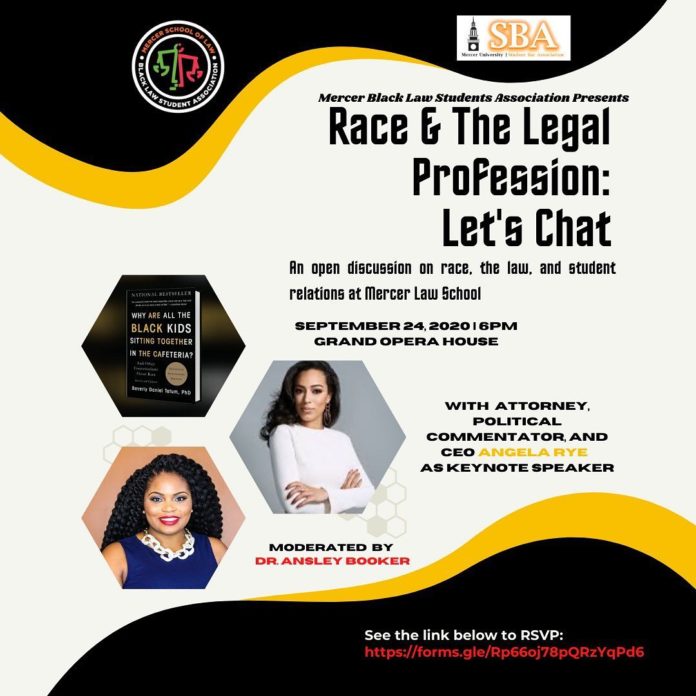
The unjust deaths, arrests and targeting of Black men and women that led to this year’s social injustice movements, riots and protests have also raised critical and timely questions that Mercer Law students want to address.
The School of Law, along with the Mercer Law Black Law Students Association (BLSA) and Student Bar Association (SBA), plans to start a conversation about such issues by hosting an open forum called “Race and the Legal Profession: Let’s Chat.” The free event will be held Sept. 24 at 6 p.m. in Classroom C at the Law School. Overflow seating will be available to accommodate social distancing, and the event will be streamed on Zoom, as well. Attendees are required to RSVP online.
The event spawned from a few conversations BLSA students had about racial relations on campus.
“There was a lot of rhetoric going around about us amongst our white counterparts,” law student Sed Mathis said. “We just felt like there was a disconnect, and it seemed obvious.”
Mathis spoke to Mercer Law School Dean Cathy Cox about the idea of conducting an open conversation.
“We wanted to change the existing narrative of racial injustice and take active steps to prepare our next generation of lawyers to do the same,” said Cox. “We have made intentional efforts to work with student leaders to provide programming and discussions that expand the horizons of our law community. First, we have to talk to each other.”
“It was just going to be a little discussion or town hall-type event between students at the law school,” Mathis added. “The more we talked, the bigger it became, and we realized that it could touch so many more people.”
Thursday’s event will be centered around the book Why Are All the Black Kids Sitting Together in the Cafeteria?, written by psychologist, educator and Spelman College President Emerita Dr. Beverly Tatum. Mercer Law provided a copy of the book to every law student over the summer.
“One of the things I’m hoping that people take away from this event is just talking about a more inclusive environment and more inclusive university,” Mercer’s Director of Diversity and Inclusion Dr. Ansley Booker said. “If you look at the context and what the book is really talking about, it’s really about how we can make sure that P-12 schools and universities are engaging in inclusive policies and practices and are as supportive as possible.”
Dr. Booker will be moderating the event alongside highly decorated attorney Angela Rye. Rye is the CEO of the political advocacy firm IMPACT Strategies in Washington, D.C., and is a political commentator and analyst on CNN and NPR. She is a former executive director and general counsel to the Congressional Black Caucus and an alumna of Seattle University Law School.
“The premise of actually having this event was for law students to have a speaker to engage them on public policy, law, discrimination, racism and inclusion,” Dr. Booker said. “Angela Rye has done a lot of great work in the community, and I think this is going to be a very good discussion.”
Mercer Law School and its graduates have a history of involvement in desegregation in Georgia, such as Mercer alumnus, former Law School dean and professor, and Lifetime Trustee Judge William Augustus Bootle, who as a federal judge ordered the admission of the first African American students to the University of Georgia in 1961.
“Mercer does have a connection with desegregation laws in our community, and I think it’s important to look at the historical context,” Booker said. “Mercer also just recently celebrated 100 years of admitting women to the law school.”
Individuals of diverse backgrounds and identities are encouraged to attend the event aimed at better understanding one another’s concerns and circumstances.
“It’s about people supporting people and people talking about things that could be uncomfortable or that don’t necessarily apply to them,” Mathis said. “It’s good to see people coming together.”









